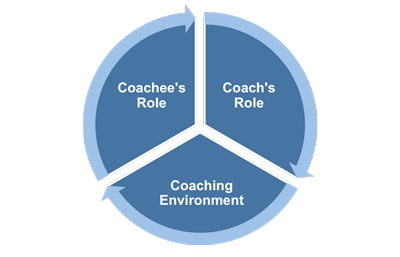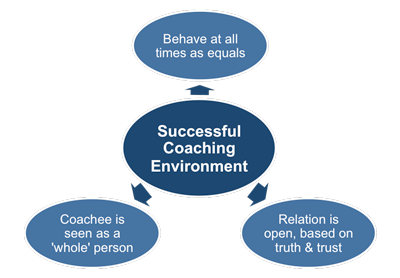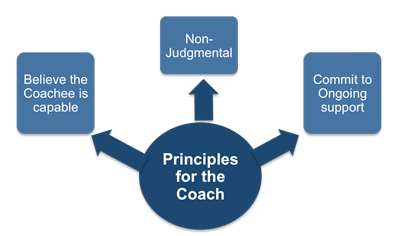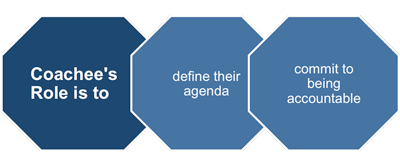Coaching Skills for Managers
Successful managers adopt key principles when developing and exhibiting key competencies, such as accounting, team building, leadership, and performance management. If you want to excel as a coach then you need to understand and adopt the principles and beliefs that are central to collaborative coaching.
 |
All of these principles have been proven and refined over many years and can be broken down into three equally important areas. Before beginning the coaching process you must ensure that you understand what your role as coach is, that your coachee is aware of their responsibilities, and that the environment in which the coaching takes place is conducive to this activity.
The principles in each of these three areas are explored in the following sections.
Related to the Environment
There are three key principles to observe in this area:
1. Both parties are equals - You and your coachee must work together in a partnership as equals. It is not your role to pass judgment on past events or to give explicit direction for the future. It is not your role to direct or control.
Your key role is to facilitate the thinking of the coachee so that they use their own knowledge to question how they conduct an activity.
 |
2. The relationship is based on truth, openness, and trust - the dialogue and discussions you have with your coachee must be open and honest. As coach you are not required to give your opinion; you want to encourage your coachee to express their own considered opinion.
If there are issues that either of you is not prepared to discuss then it should be obvious that the whole exercise is pretty much doomed to failure.
3. Coaching must address the whole person - this may appear over the top, but if ignored it will have a significant impact on the success of the coaching process. Time and experience have proven that when a coachee has issues going on elsewhere in their life these will impact their attitude or ability to perform at work. So make sure that you ask questions as you prepare for the coaching process so that you aware of any such issues involving the coachee.
In many instances your coachee may be unwilling or reluctant to discuss their personal circumstances with you. In such cases you need to find a way to address such private issues before commencing the coaching because they are adversely affecting their performance at work.
This would require you to perform the role of counselor (not coach) and this role is likely to be better performed by someone outside of the organization who has this expertise and experience of addressing personal issues.
For the Coach
As the coach in this process you need to ensure that your behavior and actions reflect the following principles.
1. The coach is not judgmental - As coach, your role is to be a catalyst for change. You achieve this by coaxing the coachee through questioning to devise their 'own' solution. Your role is not to judge them.
This is a two-fold process: firstly, you help the individual understand how their behavior is impacting their goal attainment. Then, you ask the coachee to come up with a resolution to any problems or issues in their performance using their own knowledge and skills.
In this way you are not judging the coachee's behavior or performance; you are assisting them in resolving it for themselves. This approach prevents the individual feeling they are being unfairly criticized, thus avoiding confrontation and rejection of your communication.
 |
2. You must believe that the coachee is capable - an essential aspect to successful coaching is that the coach displays his or her belief that the individual is capable of changing and improving their performance.
You can contribute information to help the coachee address their opportunities, issues, and problems. But it is ultimately the coachee's choice and decision that defines what action should be taken.
3. Commitment to ongoing support - from the outset your behaviors and actions must clearly demonstrate your commitment to providing the necessary support to the coachee throughout the complete process.
Your challenge as coach is to maintain these behaviors even when the progress is slower than you'd like. Focus on how you are contributing towards helping the individual develop their approach to goal attainment, instead of directing or guiding them as a trainer or mentor would do.
One way to ensure this is to prepare for each coaching session by reviewing current progress and reaffirming the objective of the coaching.
If you really feel as though the process is not producing any results you need to ensure that all coaching principles are being adhered to and rectify any deficiencies. This should include whether or not to continue as their coach rather than continuing with something that you are not fully committed to.
For the Coachee
Now you need to address the final area of coaching principles, that of the coachee. You must make sure that your coachee is properly prepared for this process and understands their role and responsibilities.
 |
1. The coachee must set the agenda - by getting the coachee to set their own objective for the coaching, as per their goal priorities, you demonstrate the equality within this relationship. This also applies to the setting of each coaching meeting agenda.
Your job is to help the individual identify their true talents and strengths and how they can use these to achieve their goals.
2. Commitment to action - within each coaching session the coachee is responsible for defining the actions required as a result of the meeting. This includes the commitment to conduct each action within the set timescale.
The coachee demonstrates their accountability for these actions by reporting in the next session on the progress they have made.
If you find that your attempts at coaching are not as successful as you expected then you should re-visit each area. You can then assess how well your behavior as coach and that of the coachee match the required principles. There are several coaching tools that help you to assess and develop the necessary skills and behaviors you require to make your coaching effective. These tools are described in detail in the eBook 'Coaching Skills and Models', which you can download from this website.
You may also be interested in:
Coaching Management Style | Management Coaching Skills | Differences Between Coaching and Training | Differences Between Coaching and Mentoring | Internal and External Coaches - Advantages and Disadvantages | Formal and Informal Coaching | Successful Coaching Skills.



